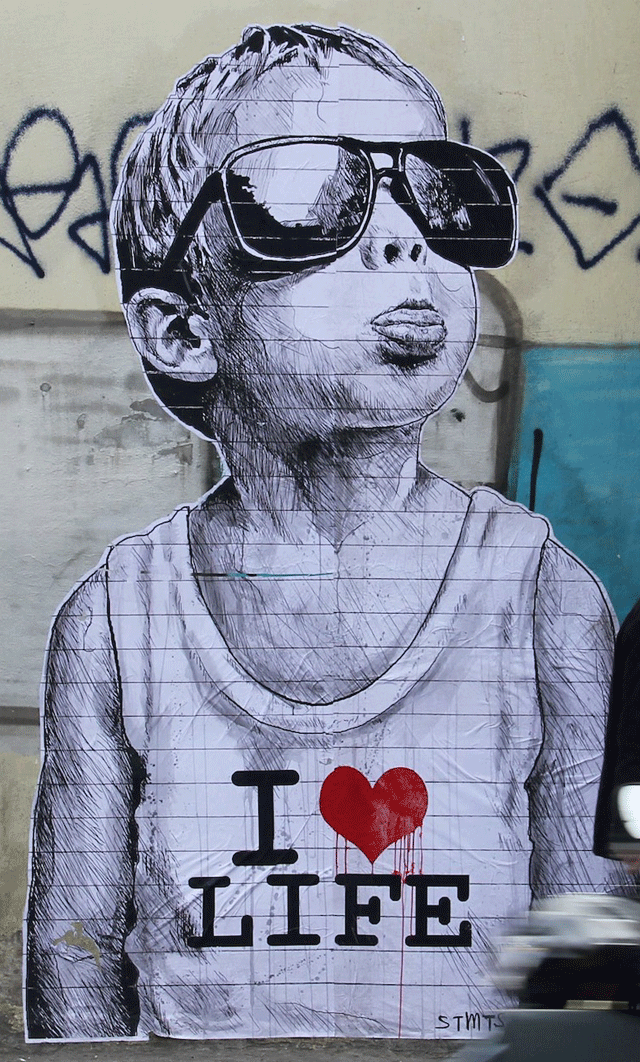 I love that image. My friend @TeriLussier fingered it. The original is at Street Art Utopia, a photo of a poster from Athens, Greece. I love it that it comes from that city, since all of Western civilization comes from Athens. What the kid’s name? You may think you don’t know, but I do. His name is Socrates. So is yours.
I love that image. My friend @TeriLussier fingered it. The original is at Street Art Utopia, a photo of a poster from Athens, Greece. I love it that it comes from that city, since all of Western civilization comes from Athens. What the kid’s name? You may think you don’t know, but I do. His name is Socrates. So is yours.
I love that ikon today, especially. My “You’re not the boss of me!” post was linked from a wooly-headed academic who insists, albeit unintelligibly, that he is so the boss of me:
Flourishing is more than a state of mind. It is an assessment that all is right with both my own world and the rest of the world. The kind of autonomy pictured above is completely incompatible with flourishing and thus with sustainability as I define it. Sustainability demands that the world be working in such a way so that all the parts are in harmony; there is no place for disconnected pieces. The absence of the conditions for flourishing to emerge can be traced to many factors. One of the most important of which is the presence of actors who behave as if they are autonomous by nature or essence. Their eyes are closed to the world as it is. There is no possibility is this kind of world. When people choose to act as autonomous nodes in an interconnected world, flourishing won’t show up either, but there is possibility in this case. The eyes can open and see that other choices are available. Sustainability is a matter of choice, but the choice must be the right one. Autonomy isn’t it.
Academics think very poorly, so you can absolve yourself from trying to parse that mess of words. “Flourishing is more than a state of mind” because it “is an assessment” — which of course is a state of mind. Human autonomy — an undoubted fact of nature — is falsely conflated with isolation to construct a very scruffy straw man. “Sustainability” — a made-up word — somehow issues demands, which suggests to me that the “place for disconnected pieces” just might be a death camp. Doubt that? What, precisely, is to be done about “the presence of actors who behave as if they are autonomous by nature or essence”? Fortunately for all of us, “There is no possibility is this kind of world.” Just keep reading that sentence until you get to an epiphany. But fear you nothing, for “Sustainability is a matter of choice, but the choice must be the right one.” There is nothing like a choice that is no choice!
When I saw this post yesterday, I left a comment, and to the author’s credit, he actually posted it:
Thanks for the link. It’s how I found you.
For what it’s worth, I think this is a terrible argument, all the rigor of a Sunday sermon.
All organisms are ontologically autonomous. There is nothing at all controversial in the matter you quoted from me. It is an explication of the path of reasoning any normal human child will have followed in order to issue the statement, “You’re not the boss of me.”
Your errors here result from the repeated invalid conflation of naturally-occurring phenomena with the existential outcomes of human choices — a very common dodge in Sunday sermons of all varieties.
If you want an incontrovertible demonstration that your choices are not “interconnected” to mine, try this: Raise my hand.
If you or inlookers here would like to explore the philosophy of human nature rigorously, my book Man Alive! is a good place to start. The first chapter, not coincidentally, is entitled “You’re in this all alone.” Chapter 11 is called “Indomitable you” — a full elaboration of the idea that you are not the boss of anyone other than yourself.
In truth, I have no idea what to make of this. I doubt Professor Ehrenfeld is really an advocate of death camps, although, as we saw in the Lynch Mobs For Tolerance™ campaign against Chick-fil-A, the death camp commandants are definitely out there. But the quality of the man’s prose suggests a different interpretation: Doddering old fool. In any case, whether the cause is senescence or mis-education, his mind is crawling with unconnected (un-interconnected?) jargon — but this is hardly rare. In the end, despite everything, I am grateful to him for the link to an essay he clearly did not read to the end. I will be in his head from now on, and someone who finds the link may discover the path to reason as a result. In the world where each of is ontologically autonomous — in the world of fact, not jargon — choice is free and each one of us can learn to embrace the truth.















